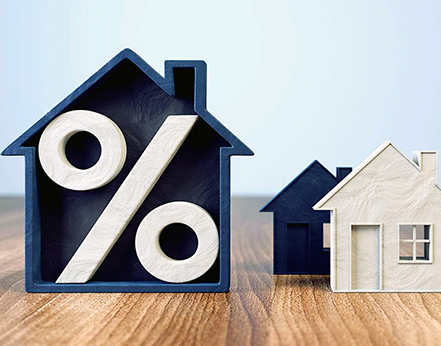Loan Against Property Consultants for Business or Personal Use
In a loan against property transaction, also known as LAP, you can secure financing by using your residential, commercial, or industrial property as security. The financial arrangement lets property owners access big loans through the utilization of their property's market value without losing their property rights. Your ability to receive funding from a property loan mostly relies on both your repayment capabilities and your property market value determination. Property owners can obtain funding for 60% of their property's market evaluation through the majority of banking institutions and financing organizations. Being fully secured lets LAP access interest rates that remain lower than the rates of unsecured forms, such as personal loans. You can extend the repayment duration to 15 to 20 years through LAP so your EMI payments stay manageable. Getting approval requires banks to verify your income documentation, credit rating, real estate documents, and additional financial obligations. It is a go-to option for many people needing large funds for business, education, or medical purposes.

At Finmarra, we help you apply for a loan against property at the best interest rate based on your needs and financial profile. With our wide network of trusted lenders and deep understanding of how LAP works, we guide you through every step, from checking your eligibility and arranging property valuation to getting the best deal with flexible terms. Whether you are salaried, self-employed, or a business owner, we make sure your property works in your favor, not just as an asset but as a strong financial tool. With Finmarra, applying for LAP becomes simple, transparent, and entirely stress-free.
Fixed vs Floating Rates in Loan Against Property Explained
When applying for LAP, you will need to choose between fixed and floating interest rate options. Each has its own use case depending on your comfort with market changes.
Fixed rate
The interest rate stays the same during the entire loan period. Your EMI will remain constant, which helps in planning your monthly expenses.
Pros:
- Predictable monthly EMIs
- Protection from rate hikes
Cons:
- No benefit if market rates fall
- Slightly higher than starting floating rates
Floating rate
The interest rate changes based on market trends or repo rate movements. Your EMI may rise or fall over time.
Pros:
- You benefit when rates go down
- Generally lower starting rates
Cons:
- Cons:
- EMI amounts can change
- Harder to predict long-term cost
Finmarra helps you compare both options and choose what fits your income pattern and risk comfort.
Factors Affecting Loan Against Property Interest Rates in India

Property type and location
Lenders prefer properties in prime or urban areas with high resale value. Well-located residential or commercial properties often get better rates.

Loan amount and tenure
Larger loan amounts and longer repayment tenures can sometimes lead to slightly higher interest rates, depending on the lender’s risk view.

Applicant’s credit score and income
A high credit score and steady monthly income show financial responsibility, which helps you get better rates with ease.

Loan-to-value (LTV) ratio
This is the ratio of the loan amount to the market value of your property. A lower LTV (say 50 percent) is safer for lenders and usually results in lower interest rates.

Lowest Interest Rates on Loan Against Property in India
The interest rates for loans against property fall below the rates of personal and business loans while using property value as security. The loan-seeking property operates as collateral, which protects lenders from financial risks. The starting point of LAP interest rates in India begins at 8.5 percent per year, going higher depending on profile characteristics and lending conditions offered by financial institutions. Loan Against Property interest rates depend heavily on three aspects: credit history, income stability, and property value, as well as the borrower's ability to repay the amount. Banks and NBFCs often offer special interest rate slabs for salaried professionals and properties located in metro cities. You can also negotiate better rates by keeping a good credit score and submitting strong proof of income. Finmarra works closely with leading banks to help customers access the lowest possible rates for LAP with clear terms and easy processing.
How Loan Against Property Differs from Home & Personal Loans
| Feature | Loan Against Property | Personal Loan | Business Loan | Home Loan Top-Up |
|---|---|---|---|---|
| Security | Needs property as collateral | No collateral | May or may not need collateral | Linked to a home loan |
| Interest Rate | Lower | Higher | Varies | Slightly higher than a home loan |
| Loan Amount | High (based on property value) | Limited (based on income) | Depends on the business size | Limited to the balance loan amount |
| Usage | Flexible | Flexible | Business only | For home-related needs |
| Tenure | Long (up to 15 years) | Short (1 to 5 years) | Medium (3 to 7 years) | Linked to the original loan |
Book Your Consultation with Finmarra for a Loan Against Property
Whether you're expanding your business, managing medical expenses, or planning your child's education, a loan against residential or commercial property can be a sensible method to acquire high-value money.
Top Benefits of Loan Against Commercial Property in Coimbatore

Factors Affecting The Loan Against Property Approval Process
Property Value
The loan amount depends on your property's current market value. Lenders usually offer 50 to 70 percent of the property’s worth.
Income Stability
Whether you are salaried or self-employed, a stable and regular income builds trust with lenders and improves your approval chances.
Credit Score
A good credit score shows that you have paid past loans on time. It helps in quicker approval and better interest rates.
Age of the Applicant
Younger applicants get longer tenure options, but even older applicants can get approved if they have enough income and clear title documents.
Existing Liabilities
If you already have other loans or EMIs, lenders will check if you can handle a new loan. Lower liabilities help in getting better offers.
Essential Documents For Loan Against Property Application
Identity and Address Proof
- Aadhaar Card
- PAN Card
- Voter ID
- Passport or Utility Bills for Address Verification
Income Proof
- Salaried: Recent Salary Slips, Form 16, and Bank Statements for the Last 6 Months
- Self-employed: Income Tax Returns for the Past 2 to 3 Years, Audited Financials, and Bank Statements
Property Documents
- Registered Sale Deed or Title Deed
- Property Tax Receipts
- Approved Building Plan (If Applicable)
- Encumbrance Certificate
Bank Statements
- Personal and Business Account Statements for the Last 6 to 12 Months to Show Cash Flow and Repayment Ability
Eligible Property Types for Loan Against Property India
You can use different types of properties as collateral while applying for a LAP, as long as the ownership is clear and the market value is acceptable to the lender.

Self-Occupied Residential Property
Your own home can be pledged if it is free from legal issues and has valid ownership records.
Self-Occupied Residential Property
Your own home can be pledged if it is free from legal issues and has valid ownership records.

Rented-Out Property
You can also pledge property that is given on rent, as long as it has clear papers and holds good market value.
Rented-Out Property
You can also pledge property that is given on rent, as long as it has clear papers and holds good market value.

Commercial Property
Shops, offices, clinics, or any other business-use buildings can also be mortgaged for a LAP.
Commercial Property
Shops, offices, clinics, or any other business-use buildings can also be mortgaged for a LAP.

Plot Or Land
Some lenders accept land or plots as collateral, but this depends on the location, usage, and documentation. It’s always best to check with the lender first.
Plot Or Land
Some lenders accept land or plots as collateral, but this depends on the location, usage, and documentation. It’s always best to check with the lender first.
Loan Against Property Eligibility and Required Documents
A wide range of people can apply for LAP, as long as they meet the eligibility and documentation requirements. These include:
Salaried Professionals
If you are employed with a regular income and have a property in your name, you can apply by submitting your income proof, property papers, and ID documents.
Self-Employed Individuals
Doctors, architects, freelancers, or anyone running their own work with stable earnings can apply. Banks will check business income proof, tax returns, and property ownership.
Business Owners
Whether you run a shop, a service unit, or a small company, you can apply for LAP by submitting business financials and legal proof of property ownership.
Retired Individuals
In some cases, retirees with steady pension income or rental income and clear property titles can also be eligible, depending on the lender’s policy.
Key Documents Needed
Income proof (salary slips, ITR, bank statements) and property ownership proof (title deed, tax receipts) are the most important documents for LAP approval.





